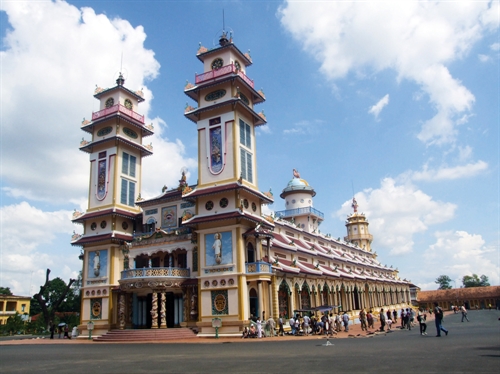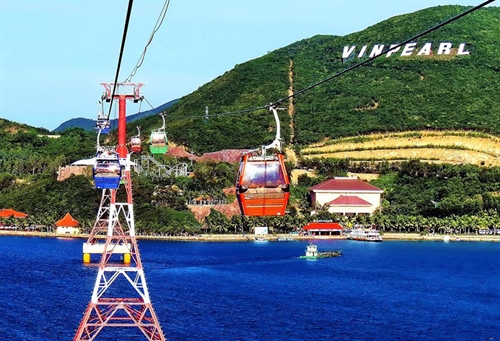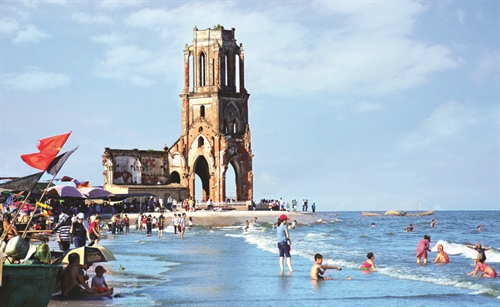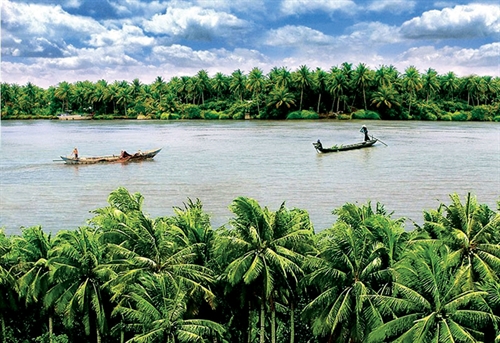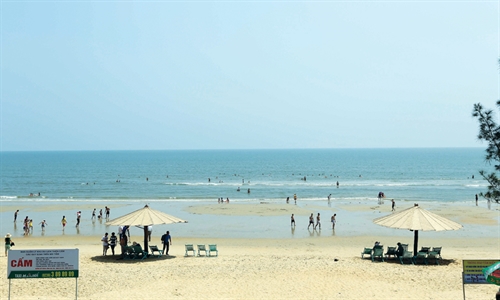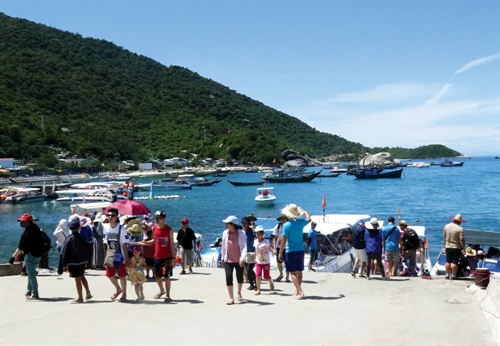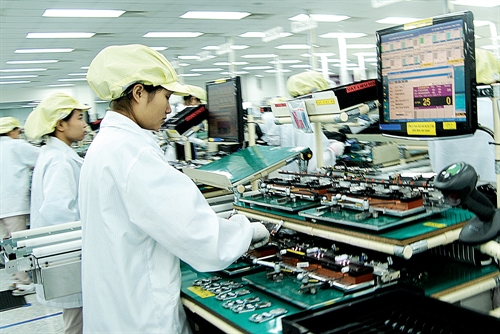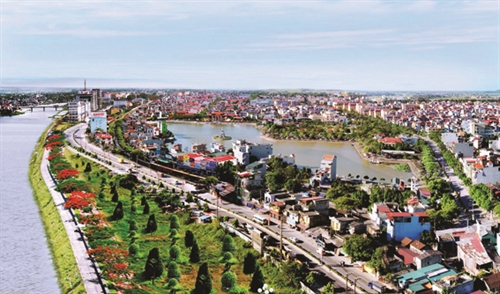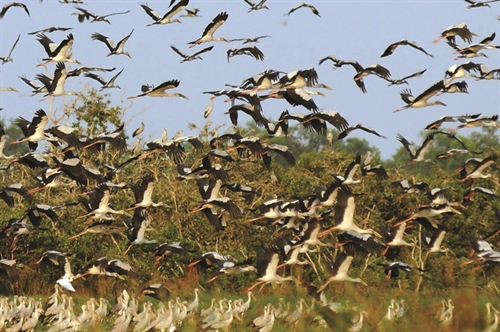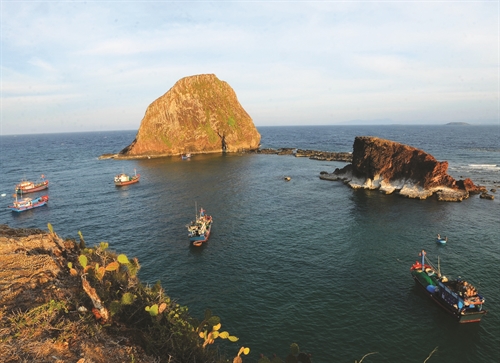As a northern midland province, Phu Tho borders Tuyen Quang and Yen Bai provinces to the north, Hanoi to the south, Son La and Hoa Binh provinces to the west and Vinh Phuc province to east. The province has a natural area of around 3,530 square kilometers and a population of 1.37 million. Phu Tho is home to Kinh (Viet) people as the most populous and 33 other ethnic groups, including Muong, Dao, Cao Lan and H’Mong. It has Viet Tri city, Phu Tho town and 11 districts, namely Thanh Son, Tan Son, Yen Lap, Cam Khe, Tam Nong, Thanh Thuy, Ha Hoa, Thanh Ba, Doan Hung, Lam Thao and Phu Ninh.
Located in the intersection of the Red, Da and Lo rivers, Phu Tho province is the western gateway of Hanoi and on the Noi Bai-Lao Cai expressway and the Trans-Asia railway, which is considered as its great advantage to promote economic exchange between the northern mountainous provinces and China’s Guangxi and Yunnan provinces.
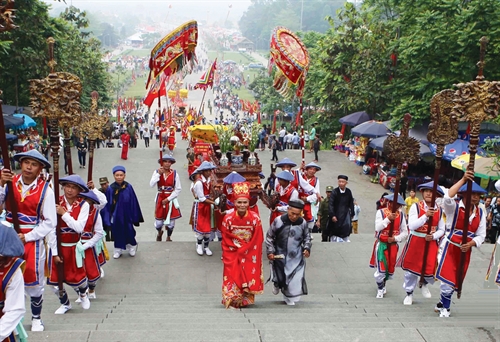 |
| A worship procession at Hung Kings’ Temple in Phu Tho province in the 2018 Hung Kings’ Death Anniversary__Photo: Thanh Tung/VNA |
Policies to lure foreign investment
In an open letter to investors, chairman of the Phu Tho provincial People’s Committee Bui Minh Chau pledged to create the most favorable conditions for and stand side by side with investors, emphasizing that “we see your business as ours”.
At a conference to promote investment in Phu Tho province that took place in Tokyo, Japan on April 12, Chau briefed Japanese businesses of Phu Tho’s potential for the development of mechanical industry, hi-tech agriculture and forestry and tourism service.
At present, more than 150 foreign-invested enterprises with a combined registered capital of some USD 1.1 billion are operating in the province, said the chairman.
According to Do Huyen Bao Ngoc, deputy head of the business registration and enterprise investment section of the Phu Tho Planning and Investment Department, in the first quarter of 2018, the province granted investment licenses to three new foreign direct investment (FDI) projects totaling around USD 8 million and permitted two existing projects to add USD 45.5 million to their registered capital. The newly licensed projects are specialized in garment and textiles, PP plastic bags and electronic spare parts.
The Republic of Korea (RoK) is the top investor representing nearly 90 percent of the province’s three-month FDI figures, said Ngoc.
As a result, Phu Tho ranked 17th out of 63 provinces and cities in attracting FDI, reported the Foreign Investment Agency under the Ministry of Planning and Investment.
Under the investment promotion program for 2018, Phu Tho plans to attract between VND 5.5 and 6 trillion (USD 244.5-263.2 million) in domestic investment and FDI capital.
In addition to hi-tech and supporting industries, the province is calling for investment in intensive agro-forestry product processing, tourism and transportation. It will step up the attraction of hi-tech, energy-saving and environment-friendly FDI projects and those expected to turn out high added value.
To achieve these targets, the province will further simplify and shorten time to complete administrative procedures, improve the investment environment and raise the provincial competitiveness index.
The province will constantly update information about its investment policies, laws, procedures and environment on its websites and distribute DVD and leaflets showing its images in Vietnamese, English, Japanese and Korean languages.
Phu Tho authorities will regularly work with investors and enterprises to address difficulties and remove hindrances in their business and production activities and ask the latter to invite their potential partners to invest in the province.
To attract investment in the existing seven industrial parks and 25 industrial clusters, the province offers numerous incentives to investors. Regarding taxation, an investment project with a total investment capital of at least VND 6 trillion disbursed within three years since being granted an investment certificate and over 3,000 workers is entitled to corporate income tax exemption for four years since the generation of taxable income and a 50-percent tax reduction for subsequent nine years.
Meanwhile, projects investing in areas meeting with socio-economic difficulties or building infrastructure of industrial parks, industrial clusters and export processing zones are entitled to land rental exemption throughout their operation duration in the province.
Hospitality potential
Phu Tho province is well-known for the worshipping rituals of Hung Kings, the founders of the Vietnamese nation’s first state of Van Lang in Phong Chau (now Phu Tho province), for their death anniversary - the 10th day of the third lunar month. Both the worshipping rituals of Hung Kings and xoan singing of the province have been listed by the United Nations Educational, Scientific and Cultural Organization (UNESCO) as intangible cultural heritages of humanity. There are three forms of xoan singing: worship singing for Hung Kings and village guardian spirits; ritual singing for bumper crops, health and luck, and festival singing where villagers alternate male and female voices in a form of courtship.
The province also boasts 150 historical and cultural relics such as the Au Co Temple in Hien Luong commune, Ha Hoa district; and beautiful landscapes, including the Xuan Son National Forest in Tan Son district, the Emerald Island Resort in Thanh Thuy district, and the Thac May, Thac Mo Ecotourism Park in Thanh Son district. It has 66 traditional craft villages employing around 28,000 laborers. They are engaged in agricultural, forest and aquatic product processing and preservation; art and handicraft; and bonsai creation and trading. Phu Tho is an ideal place for visitors to explore the nature and relax.
At present, the province has 32 hotels, 296 guest houses and 14 travel agents.
Vu Thi Hoai Phuong, head of the tourism management section of the Phu Tho Culture, Sports and Tourism Department, told the Vietnam Law and Legal Forum magazine that the province received more than 1,250 foreign arrivals and earned a turnover of around VND 4.2 billion in the first quarter of the year. The tourists came mainly from the US, UK, Sweden, Switzerland and Germany.
At present, the province welcomes one to three international delegations on one-day river tours every month, added Phuong.
Tourism sector has been defined as one of the province’s four socio-economic development breakthroughs in the 2016-2020 period at the 18th provincial Party Committee.
Phu Tho has signed tourism cooperation agreements with Hanoi and other southeastern provinces. In addition, the province has joined the seven northwestern mountainous provinces of Hoa Binh, Son La, Lai Chau, Dien Bien, Lao Cai, Yen Bai and Ha Giang in an expanded tourism development cooperation program.
Apart from tours to traditional craft villages, spiritual tours and community-based ecological tours in the province, Viet Tri city also plans to develop MICE (meetings, incentives, conferences, exhibitions) tours.
The province expects to receive around 7,500 foreign arrivals and earn a gross profit of VND 20 billion this year.-
